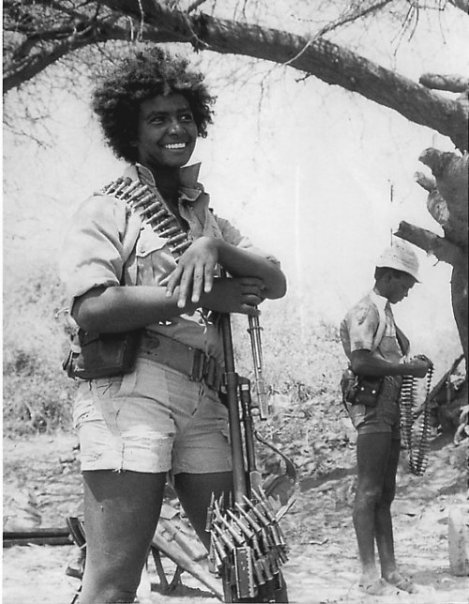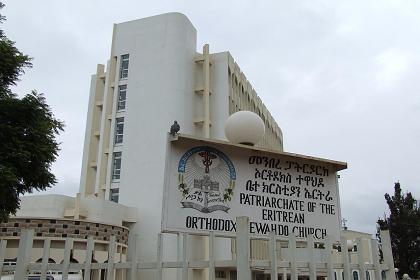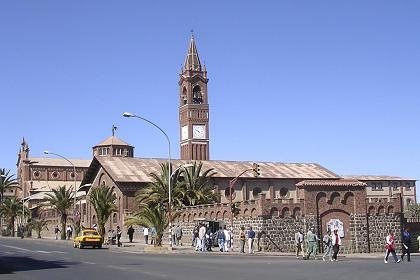**This is an excellent article by Michela Wrong. She is also the Author of "I didn't do it for you" How the world betrayed a small African Nation. **
A grim deadline expires in a few weeks' time. It will pass unnoticed by the British public, but that doesn't make it any less important, not just for the two nations involved, but for Africa as a whole. For it sets the seal on an abject failure by the west to ensure that a vital African ally respects international law. And the act of defiance our governments have chosen to ignore will undermine peacemaking on the continent for decades to come.
At the end of November, the frontier separating Eritrea from Ethiopia becomes officially demarcated, in the teeth of Ethiopian opposition. For five years, Addis Ababa has done its best to prevent cement pillars being placed along a line designated by the international Eritrea-Ethiopia Boundary Commission in April 2002, a ruling that both states originally agreed was to be final and binding. The exasperated commission chairman, Sir Elihu Lauterpacht, announced last November that if the stalemate continued, the border would automatically count as legally demarcated a year hence, pillars or no.
With that announcement, Lauterpacht in effect told the international community: "We've done our bit. The rest is up to you." Its mandate complete, the commission will disband. Law yers, however distinguished, can do only so much. Ever since it emerged that the commission's ruling placed the contested town of Badme, of huge symbolic importance as the flashpoint of the 1998-2000 war, inside Eritrean territory, it has been clear that only realpolitik could secure Ethiopian compliance.
Those five years of procrastination did not come cheap for you and me. A UN peacekeeping force has been deployed along a buffer zone between the two states throughout, at a cost to western taxpayers of more than $1bn. All for naught, because a new war now looks horribly likely. Both sides have moved troops up to the border and Ethiopia recently announced that it was considering terminating the Algiers Agreement, which ended the fighting in 2000. The rising rhetoric feels like an ominous countdown to a resumption of hostilities.
Could all this have been avoided? Outsiders often claim both governments are so pig-headed that outside pressure either has no effect or backfires. But the west never tried. A US diplomat friend used to accuse me of naivety when I struggled to interpret governments' behaviour. "Look at what they do, not what they say," he would scold. The Addis regime looked at what the west did when confronted by its defiance, not what it said, and concluded - correctly - that it had nothing to fear from continued intransigence.
Since the days of Haile Selassie, giant, Christian Ethiopia has been regarded as the Horn of Africa state the west had to keep onside, too big, too strategic, too poor to ignore. The war on terror buttressed that belief, notwithstanding evidence that Addis Ababa's aggressive behaviour was destabilising the region.
So, after Ethiopian troops shot nearly 200 de monstrators protesting against rigged elections and jailed the opposition, western donors made only token adjustments to the $1.9bn in funding they give Prime Minister Meles Zenawi each year. Any disapproval Washington might have expressed over Ethiopia's invasion of Somalia rang hollow, given the enthusiastic help it lent the army as it hunted retreating Islamist forces. And Ethiopia's warning that it might terminate the Algiers Agreement came soon after the US state department said it was preparing to put Eritrea on its list of terrorism-supporting states for its role in Somalia: a green light to Addis if ever there was one. What they do, not what they say.
One doesn't have to be an admirer of the Eri trean government - undemocratic, stiflingly militaristic, cynically ready to support any rebel group that threatens Meles - to quail at the ramifications of the west's limp behaviour. By indulging a delinquent favourite, the inter national community has set a precedent other regional bullies will happily follow. We can expect a repeat next door in Sudan, where the government and the rebels have yet to demarcate the frontier separating south from north. The Eritrea-Ethiopia dispute was bitter enough. In Sudan, oil pushes the stakes even higher. Khartoum has already refused to implement a "final and binding" ruling defining the limits of oil-rich Abyei Province. What is the likelihood of its complying with any border ruling that locates oil deposits out of reach in the south?
Africa as we know it is a recent invention. Quixotic and impractical, its colonial frontiers are poorly charted and easily challenged. Fear of the mayhem that would ensue if member states regarded existing boundaries as being up for debate prom pted the Organisation of African Unity, in 1964, to embrace the doctrine of uti possidetis, that colonial borders should remain as they are. The Eritrea-Ethiopia debacle, which will be finalised next month, undermines that principle, weakening future attempts at peaceful arbitration. The message it sends is that "final and binding" frontier rulings are negotiable; and that while minnows must obey international law, large countries with friends abroad can defy it with impunity. There could be few more dangerous signals to send a fragile continent.
Sunday, October 28, 2007
Subscribe to:
Post Comments (Atom)












































No comments:
Post a Comment